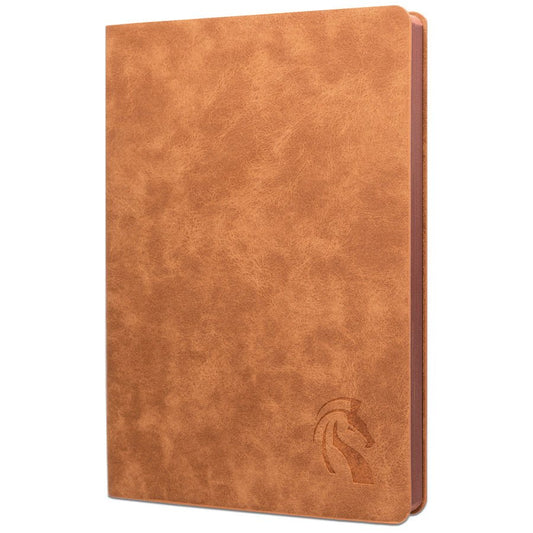
Welcome to a journey through the mind! As we explore deep and intriguing philosophical questions, these 50 journal prompts will guide you to think critically and reflectively about various aspects of existence, reality, and morality.
Whether you are a seasoned philosopher or just getting started, these questions will help you dive into the complexities of life and human nature. Let's challenge our understanding and expand our perspectives together.
Philosophical Thoughts on Existence
- What makes you sure that you exist?
- If you had to describe life, what would you say it is?
- Why do you think we dream?
- Can you imagine what nothingness looks like?
- Do you think animals are aware of their existence like humans are?
- What does it mean to live a good life?
- Are there limits to human understanding?
- Can something come from nothing?
- Is there an end to space?
- What do you think happens after we die?

"Question everything. Learn something. Answer nothing."
Your Views on Reality
- How do you know your perceptions are real?
- What could be beyond the edge of the universe?
- Do you believe in alternate realities or dimensions?
- How do you define time?
- Is time travel possible, and would you want to travel in time?
- What makes you the same person you were as a child?
- How would you explain color to someone who can’t see?
- Do you think machines could ever become conscious?
- What is the nature of truth?
- Can there be absolute truth or is all truth relative?

"The unexamined life is not worth living."
Philosophical Questions on Morality
- What makes an action right or wrong?
- Is morality universal or is it culturally influenced?
- Can there be justice without laws?
- Do animals have rights, and why?
- What does freedom really mean?
- Should everyone have the right to speak freely?
- What is more important: freedom or security?
- Is it ever okay to lie?
- Do intentions matter more than actions?
- How do you decide what is fair?

"Dare to think for yourself."
Exploring Self and Identity
- What makes you, you?
- Are your thoughts and feelings what make you who you are?
- How much do your genes define you?
- How do you think language affects how you think?
- Can you have a self without society?
- What does it mean to be independent?
- Is there a purpose to human life?
- How does culture shape your identity?
- Do we have free will?
- What role do your choices play in defining your future?

"Philosophy begins in wonder."
Understanding Human Connection
- What is love, and why is it important?
- Is it possible to live a solitary life?
- What is the value of friendship?
- How important is empathy in human relationships?
- Can you truly understand another person?
- What binds people together more: joy or suffering?
- Is peace on earth achievable?
- How do art and music connect people?
- What can we learn from children?
- How does technology affect our relationships?

Congratulations on completing these philosophical journal prompts! Through your reflections, you’ve tackled some of the most profound questions that have puzzled thinkers for centuries.
Remember, philosophy is not just about finding definitive answers but about exploring possibilities and expanding our understanding. Continue to question, think deeply, and discuss your ideas with others.
May your philosophical journey bring you closer to wisdom and insight.
Philosophical inquiry is a journey that has intrigued and challenged individuals for centuries. From the great thinkers of ancient Greece to modern-day philosophers, answering profound questions about life, existence, and the nature of the world requires deep thought and reflection. One of the most effective ways to engage with these questions is through the practice of journaling. In this article, we will explore how using philosophical journal prompts can help us embark on introspective quests and foster personal growth. By combining timeless wisdom with modern techniques like journaling, we can create a curated environment for self-reflection, exploration, and personal development.
The Practice of Philosophical Journaling
Journaling is an ancient practice that invites us to engage with our thoughts, emotions, and experiences. When we combine this with philosophical inquiry, it becomes a powerful tool for personal growth. A philosopher’s journal serves as a timeless vessel for contemplating life’s great questions and exploring the meaning of life.
Philosophical journaling is not simply about writing; it is about asking ourselves deep, reflective questions that allow us to gain insight into our beliefs, values, and perspectives. By incorporating philosophical journal prompts, we challenge ourselves to think critically and expand our understanding of the world.
Great Philosophical Questions for Journaling
Some questions have remained timeless, inspiring people to reflect on their lives and the human experience. Asking ourselves these great questions through journaling helps foster critical thinking and leads to deeper self-understanding.
- What is the meaning of life?
- What is the nature of existence?
- What role does morality play in our daily lives?
- How can one live a virtuous life?
- What is the nature of happiness?
These philosophical questions provide an excellent starting point for your journaling journey. By engaging with these, individuals can navigate their own philosophical odyssey and explore new ways of thinking.
The Role of Stoicism in Philosophical Journaling
One school of thought that can be particularly helpful for those engaging in philosophical journaling is Stoicism. The Stoics believed in cultivating virtues such as wisdom, courage, and self-discipline while practicing detachment from external outcomes. Journaling is a powerful method for integrating Stoic philosophy into daily life, allowing us to reflect on our actions, thoughts, and reactions.
Using stoic journal prompts, individuals can explore topics such as resilience, detachment, and personal values. These prompts encourage us to reflect on how we react to challenges and how we can better align our actions with stoic virtues.
Example Stoic Journal Prompts:
- How do I handle adversity in my life?
- What external circumstances am I overly attached to?
- In what ways can I cultivate wisdom in my daily decisions?
By regularly practicing stoic journaling, individuals can foster a deeper sense of self-discipline and mindfulness, creating a navigational chart for their philosophical journey.
Philosophy as a Way of Life
For many people, philosophy is not just an academic discipline but a way of life. Engaging with philosophy through journaling allows us to integrate these ideas into our daily experience. The branches of philosophy—such as ethics, epistemology, and metaphysics—offer a wide range of topics for reflection.
By contemplating moral principles and values, individuals can develop their ethical frameworks. Socratic inquiry is a powerful method of examining one’s beliefs by continuously asking questions to clarify and deepen understanding. This process mirrors the reflective practice encouraged by journaling.
Socratic Journal Prompts:
- What assumptions do I make about the world, and are they justified?
- How do my beliefs align with my actions?
- What are the moral principles that guide my decisions?
Engaging in Socratic inquiry through journaling allows us to become more aware of the intricacies of our thoughts, enabling us to gain insights into our motivations and behaviors.
The Benefits of Philosophical Journaling
The process of philosophical journaling provides numerous benefits that enhance both our personal and intellectual lives. Some of the profound benefits include:
Cultivating Mindfulness
Philosophical journaling encourages mindfulness by fostering present-moment awareness. By reflecting on the present moment, individuals can better understand their thoughts and feelings, leading to greater emotional awareness and clarity.
Self-Reflection and Personal Growth
Journaling allows us to engage in self-reflection, leading to personal growth. By regularly examining our inner landscape, we can identify areas for improvement and refine our understanding of our values, beliefs, and emotional processes.
Fostering Critical Thinking
Engaging with philosophical questions encourages us to practice critical analysis and develop a disciplined approach to problem-solving. This allows us to sharpen our cognitive abilities and become more rigorous in our thinking.
Philosophical Journal Prompts for Self-Reflection
To engage deeply with philosophical questions, consider incorporating the following prompts into your journaling practice:
- What is my purpose in life, and how can I fulfill it?
- How do I define success, and is it aligned with my values?
- In what ways does my life reflect the pursuit of wisdom and knowledge?
- How do I handle uncertainty and the unknown?
These prompts not only foster self-reflection but also encourage individuals to explore the vast sea of human experience, delving into the depths of the mind and discovering new ideas.
The Journey of Philosophy and Writing
Philosophical journaling is a journey, and like all journeys, it requires time and patience. The act of writing itself is a powerful tool for exploring the mind and synthesizing thoughts. Through the practice of journaling, individuals can document their insights, questions, and reflections on life.
Writing in a philosopher’s journal is a deeply personal experience that allows individuals to engage with ancient wisdom while also exploring contemporary self-exploration. Whether we are reflecting on great thinkers or navigating our own modern-day odyssey, journaling provides a timeless vessel for personal growth and understanding.
Creating a Journaling Practice
Creating a consistent journaling practice is key to gaining the full benefits of philosophical reflection. Here are some tips for creating a journaling practice that fosters personal growth:
Set Aside Time
Dedicate specific moments in your day to engage in journaling. Whether it’s in the morning or at night, carving out space for reflection is essential for cultivating mindfulness and personal development.
Use Prompts
Incorporating journal prompts helps guide your thoughts and reflections. These prompts can serve as a starting point for exploring deep questions and new ideas.
Be Patient
The journey of philosophical inquiry is not one of immediate answers. It requires time, patience, and the willingness to explore different paths of thought. Allow yourself to embrace uncertainty and the unknown as part of the process.
Reflect on Your Growth
Over time, journaling will reveal patterns of thought, emotional processes, and personal growth. Periodically reflect on your past entries to see how far you’ve come and where you want to go.
The Modern-Day Odyssey
Philosophy is a modern-day odyssey, and journaling is the navigational chart we use to explore this vast sea. Through rigorous examination and deep reflection, we develop the tools to understand our lives, motivations, and values.
By engaging in philosophical journaling, individuals can gain profound insights into their own experience and foster a deeper understanding of the world. Whether reflecting on Stoic philosophy, practicing Socratic inquiry, or contemplating life’s timeless questions, journaling is the gateway to personal growth and wisdom.
Conclusion
In conclusion, journaling is a powerful tool for engaging in philosophical inquiry and exploring the vast landscape of the mind. Through the use of philosophical journal prompts, we can practice critical analysis, cultivate mindfulness, and foster personal growth. By asking ourselves deep, reflective questions, we embark on a journey of self-expression, growth, and wisdom.
Philosophical journaling offers a timeless vessel for discovering insights and exploring the depths of our thoughts, beliefs, and motivations. As reflective practitioners, we navigate this modern-day odyssey with curiosity, resilience, and a desire to grow, ultimately arriving at a deeper understanding of ourselves and the world around us.
"Philosophical Journal Prompts inspire creativity."
let prompts = "Philosophical Journal Prompts";
- Deep Prompts
- Explore inner thoughts with philosophical journal prompts.
Read Other Related Journal Prompts
50 Journal Prompts For Those Seeking Fun50 Journal Prompts For Those Exploring Goal Setting Approaches
50 Journal Prompts For Those Reflecting on November
50 Journal Prompts For Those Celebrating Halloween














1 comment
Philosophy, I always love it..these philosophical thoughs and idea I must say really great for one who doesn’t know the facts.